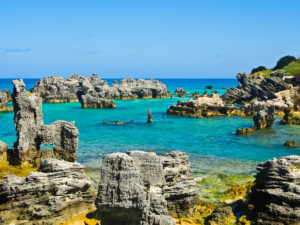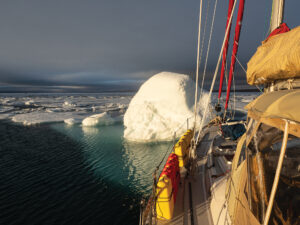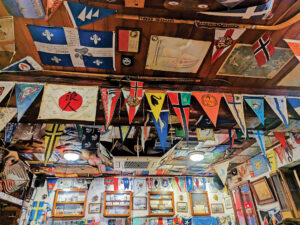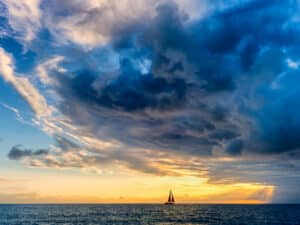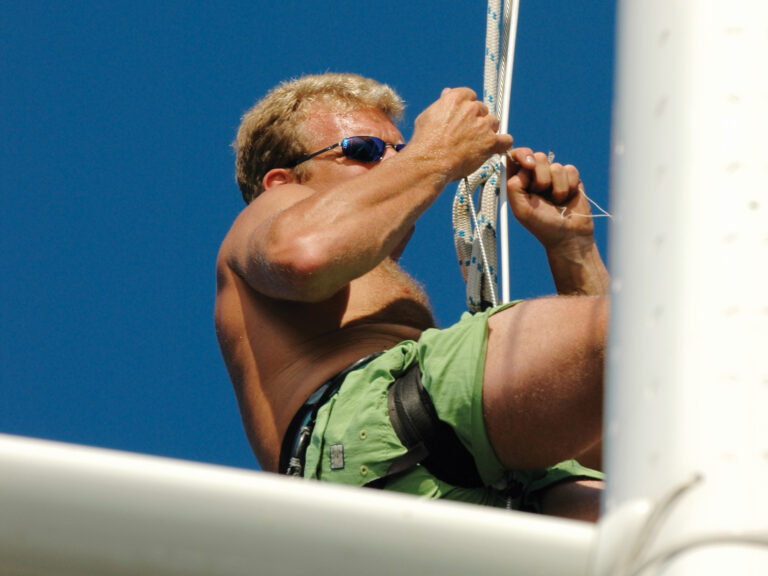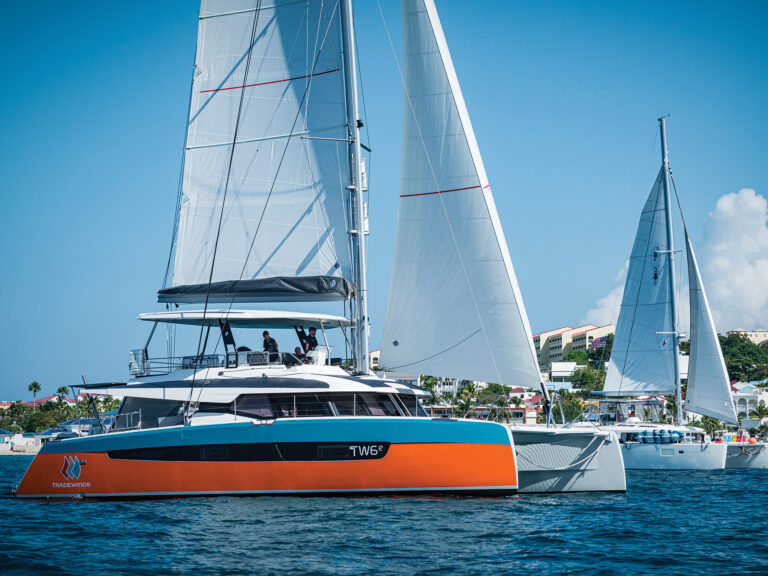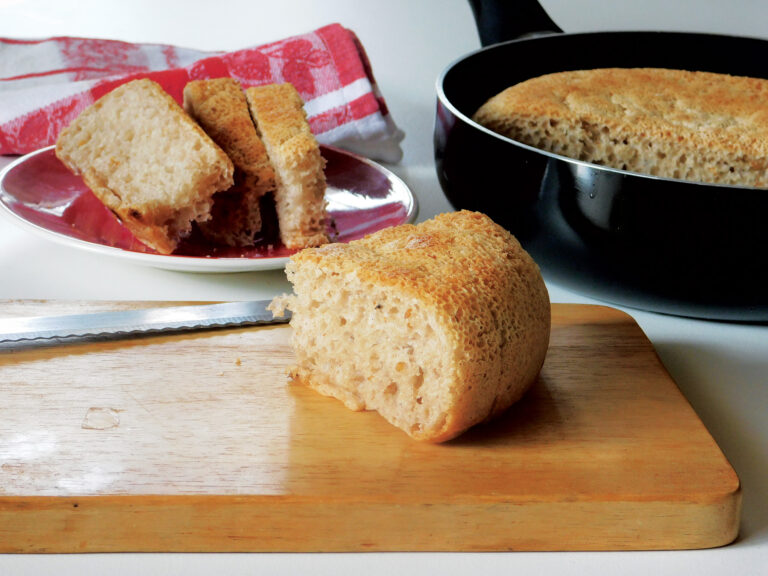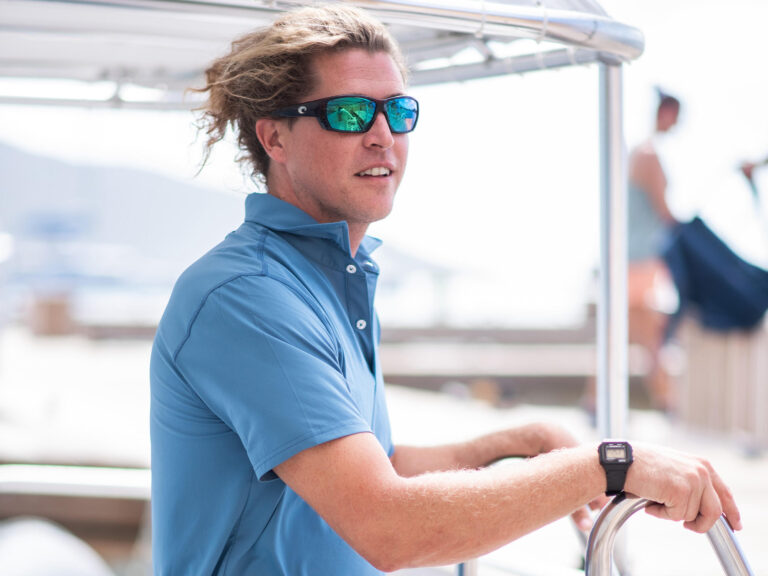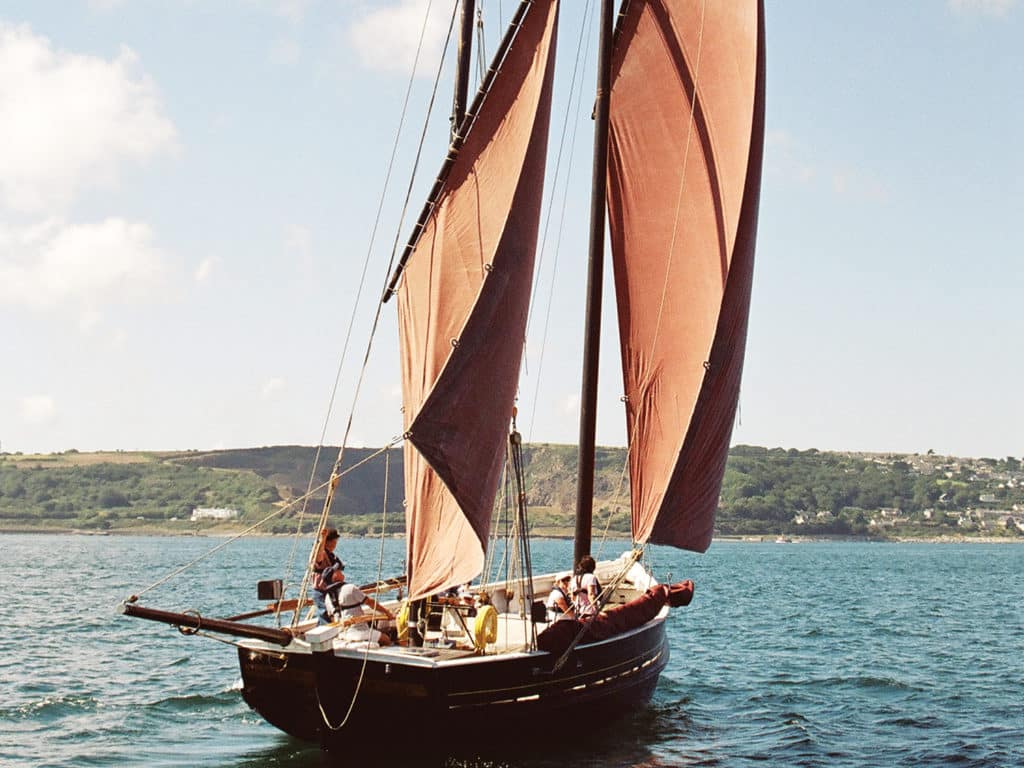
ust as the boat cleared the headland, it slammed hard into 15- and 16-foot waves. These were the Force 7 conditions that the Windy app had predicted earlier that morning. The new captain of this traditional Cornish lugger, Happy Return, looked to the seasoned mate who had a tight grip on the tiller; the mate glanced over at his pal, the second mate, who’d had the bright (if poor) idea of setting the large foresail.
These luggers don’t like windward work. They’re in their glory on long reaches, and one long tack to France, to which we were sailing from England across the English Channel, would have suited Happy Return just fine. If the new captain didn’t know this previously, he was learning it pretty quick.
Happy Return is a ketch-rigged lugger with a foremast and a mizzen; each mast carries a four-cornered dipping lug sail that Cornishmen call, predictably, “lugs.” It can set a topsail and has a retractable bowsprit. Almost 40 feet long with a 13-foot beam and a draft of 7 feet, it was originally built to set nets and stay with them in all types of weather until the hold was filled with pilchard or herring.
Twenty years ago, a trio of Cornish sailors decided that the town of Penzance needed a traditional lugger, and they found this one—the last working lugger in the United Kingdom. Happy Return had just been de-registered from commercial fishing. Its sailing rig was gone, but the boat had been built just down the coast in 1904. The trio bought the boat and motored it home. They formed a nonprofit association and began the heavy restoration work. They researched and restored the original lug rig, and then learned how to sail it.
But now the association had a problem. Today, most of the original members are in their late 60s and 70s. Sailing a lugger is heavy work, and the group needs young blood to skipper the boat and continue its ambitious summer sailing schedule. Enter Jack: the newest, youngest-qualified skipper in the association, on his first multiday cruise as captain. George, one of the older association members, had signed on as mate. Four more club members, myself included, signed on as crew. Many of the old lions considered Jack crucial for the association’s very survival, so critical eyes were following Happy Return’s track on marinetraffic.com.
And the boat was already in trouble.
The plumb stem rose to the surface and lifted to the next breaking crest. The leeward rail vanished under froth, and a heavy banging from the foresail yard drew Jack’s attention. Suddenly, one of the crew held tightly to the lee rail and retched over the side, which splashed down heavily on the swirling deck. Crabbing along, clutching to anything solid, he made his way to his bunk down below. We were now down to five active crewmembers.
“I thought we should have stayed another day,” the captain said, wiping his glasses. He was an imposing man, tall, with powerful arms and long legs. But the verdict was still out on this guy. He seemed easygoing as he joked with the crew. He sought advice from others but then made his own decisions—and his decisions were usually what he had had in mind in the first place.
“Let’s head back to Helford,” he said at last, invoking the name of our recent departure point. “Head up and we’ll drop the fores’l.”
George, the mate, struggled with the helm and finally got the boat head to wind. The crew breathed a collective sigh, but the 700 square feet of wet, snapping canvas was now hellbent on throwing itself over the side. The wooden yard laced to the head of the sail was the real danger. One love tap from that spar could knock you out cold.
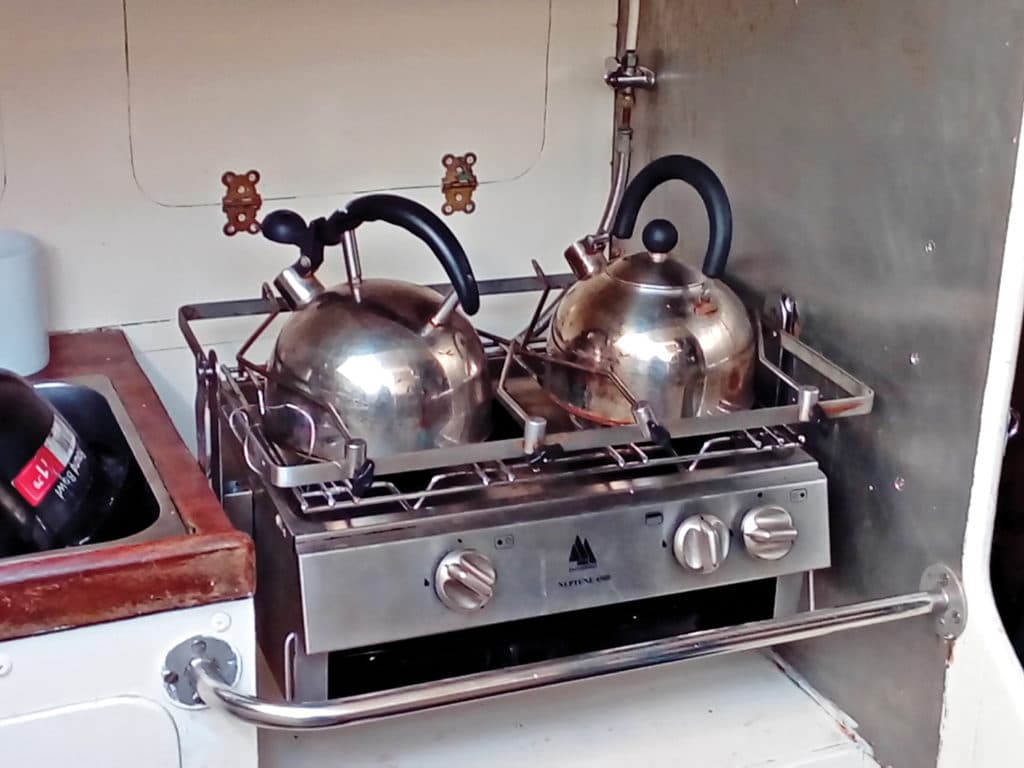
Three of us struggled the sail and its wooden yard to the foredeck. When it was finally lashed in a wet heap, Jack took the helm from the mate. He strong-armed the tiller, eased the mizzen sheet, and slowly veered the boat downwind.
Suddenly, everything changed.
The wind still slapped at the crew, but the motion was much easier. Surprisingly, under mizzen alone, Happy Return still charged along at more than 5 knots into the safety of the Helford River.
Pilot books and cruising guides agree that the Helford River is a scenic, peaceful place offering shelter from a west wind, and is well worth a visit. But this peaceful estuary has seen its share of trouble.
During World War II, the Helford River was a haven for the French Resistance. Upriver, French fishing boats were camouflaged and resupplied. They departed the Helford bound for the 100-mile passage to Nazi-occupied Brittany, with men and weapons hidden in the bilges. Floorboards were screwed down tight above them. Some boats never arrived home.
But on this beautiful July morning, after our boisterous sail and retreat the previous day, the anchorage was quiet. The crew of Happy Return, having happily arrived here the previous evening, rousted themselves from damp bunks, bumped their heads on the low deck, and cursed as they struggled into dry clothes. On deck, canvas was rolled back from the large fish hatch. Hatch boards were removed, and fresh, cool air flooded the cabin. George squeezed into the tiny galley, pulled out a large frying pan, and sparked a fire under it.
“Full English?” he asked.
“Of course!” the crew resounded as one.
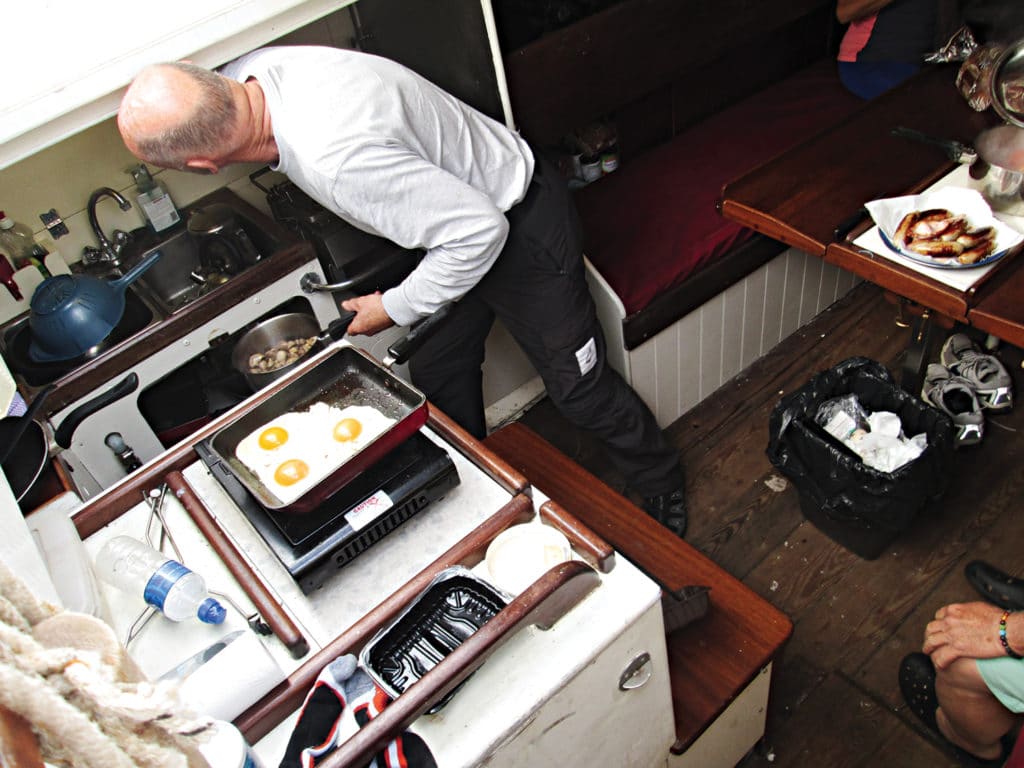
For those of us who generally carry a bowl of granola and a mug of coffee out into the cockpit and call it breakfast, a full English version can seem a bit much. Consider just the bacon: four rashers per person. Now, add the sausages, and the fried egg. Fried mushrooms and fried tomatoes are a must for many English sailors, as are baked beans and slices of toast with ample butter and jam. And everyone loves a big brew-up of tea.
A full English breakfast is an uncompromising tradition aboard Happy Return, and as we sat around the table, we speculated about the day: Should we cruise up the serene Helford River? Or make a second attempt across the channel? Capt. Jack listened, mopped his plate with a third slice of toast, and refilled his giant mug with tea. He traded banter with the crew.
George was now pacing the deck, searching for the best cellular reception. His eyes were glued to a weather app on his phone. Sea conditions were improving, and winds were favorable for a broad reach all the way across the channel. He calculated: A 100-mile passage divided by an average speed of 5 knots equaled 20 hours.
The mate poked his head down through the open fish hatch. “If we leave now,” he said, “we could be in Brittany by tomorrow morning.” Not a sound around the table except the stacking of dirty dishes and silverware. The captain slurped his tea.
“Well then,” he said. “Who’s doing the washing up?”
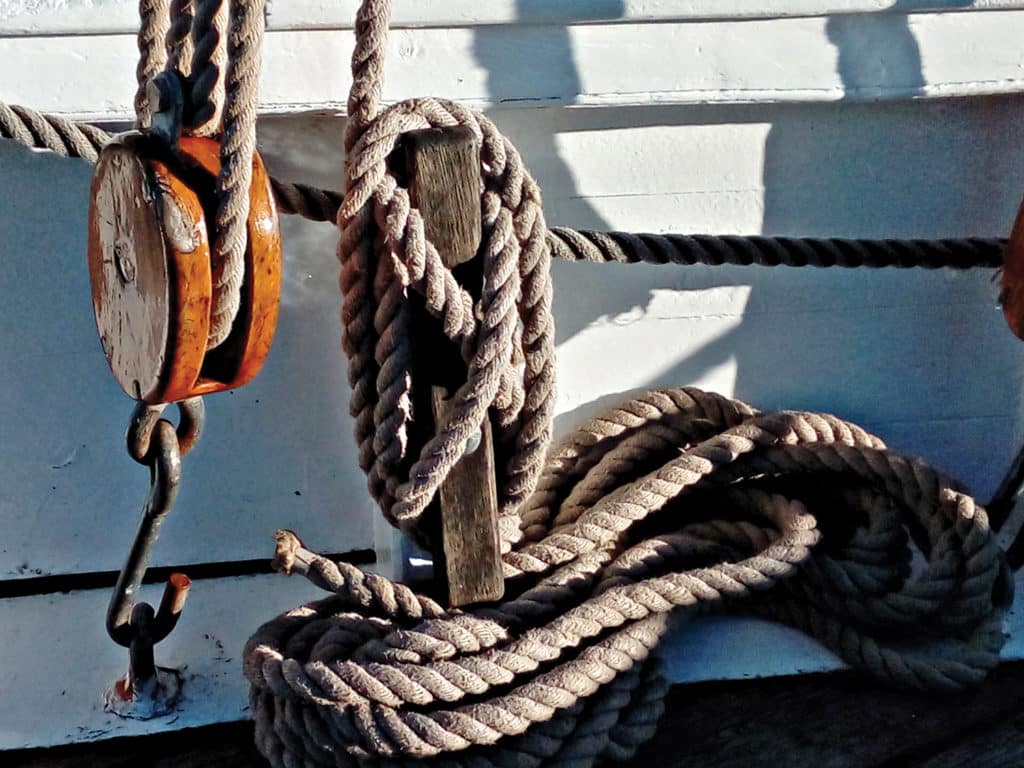
Crack! “Ouch!” The hardest thing about rising for an 0200 watch is putting on your boots—especially in a crowded cabin with, I’d just discovered, only banging headroom. Once we were suited up, George and I went on deck for our trick.
Happy Return was reeling off the miles at a steady 5 knots. Our two-hour watch took us across the shipping lanes. Dots of lights all around us revealed themselves as container ships, tankers and yachts on the glowing AIS screen. The tiller demanded all my strength and attention, but the luff tackles port and starboard helped relieve the rudder’s heavy pressure. George watched for ships while I steered. He fretted and grumbled and fussed until I finally relinquished the tiller to him. I was glad to stand up. My feet were dry and warm enough in heavy socks and rubber wellies, but as an American living in Europe, I longed for a pair of those leather Musto sailing boots all the English sailors favor.
Soon after, we picked up La Vierge lighthouse, which signaled our approach to Brittany, and Jack set a new course for Le Libentur, a cardinal buoy that marks the approaches into the harbor at L’Aber Wrac’h.
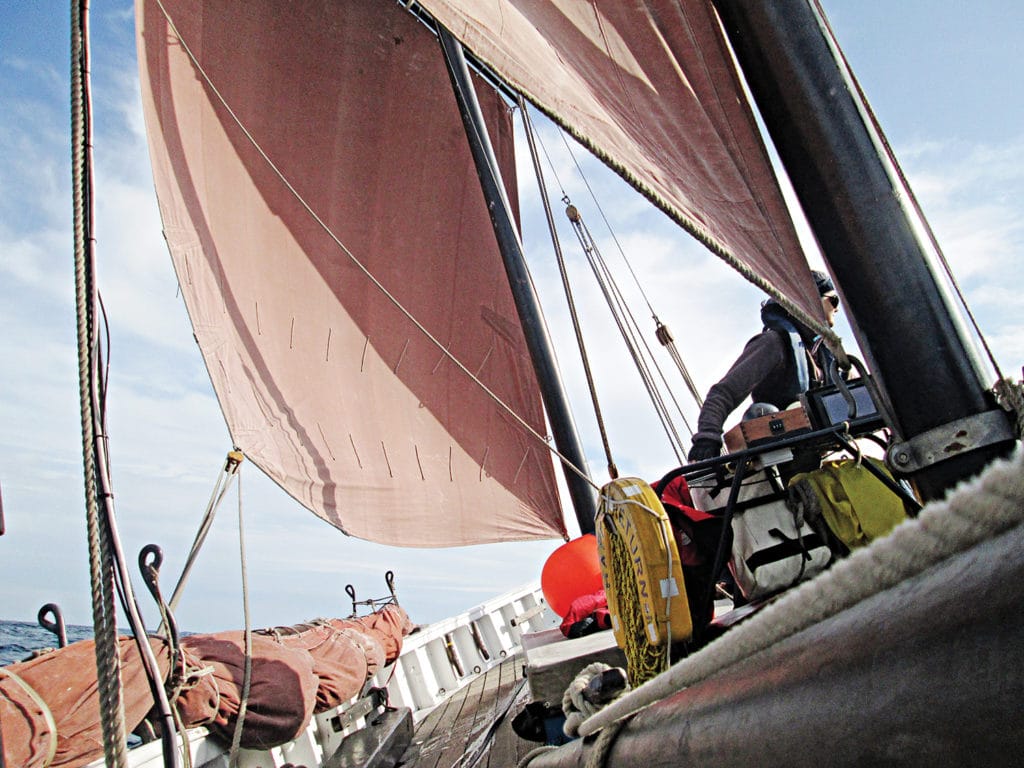
We entered a maze of rocks, ledges and fast-moving water. It was just as prickly as negotiating the coast of Maine, which I knew infinitely better. Jack referred to his paper chart and the depth sounder. Groping through the rocks, we looked for color rather than specific buoys. The channel was well-marked, but sometimes the channel markers were just piles of rocks painted with bright, red bands. We dropped sails and motored farther into the estuary, passing lines of buoys marking commercial oyster beds. Soon the busy, modern marina at L’Aber Wrac’h was to starboard. We tied up at the end float and thankfully shut off the engine.
The young fellow at the marina office spoke good English. Jack paid about 30 euros for a night on the guest dock. Clean, modern showers with endless hot water were included in the fee. The crew cleaned up—which is always thirsty work—so while the boat aired out, the captain led the way to a pub.
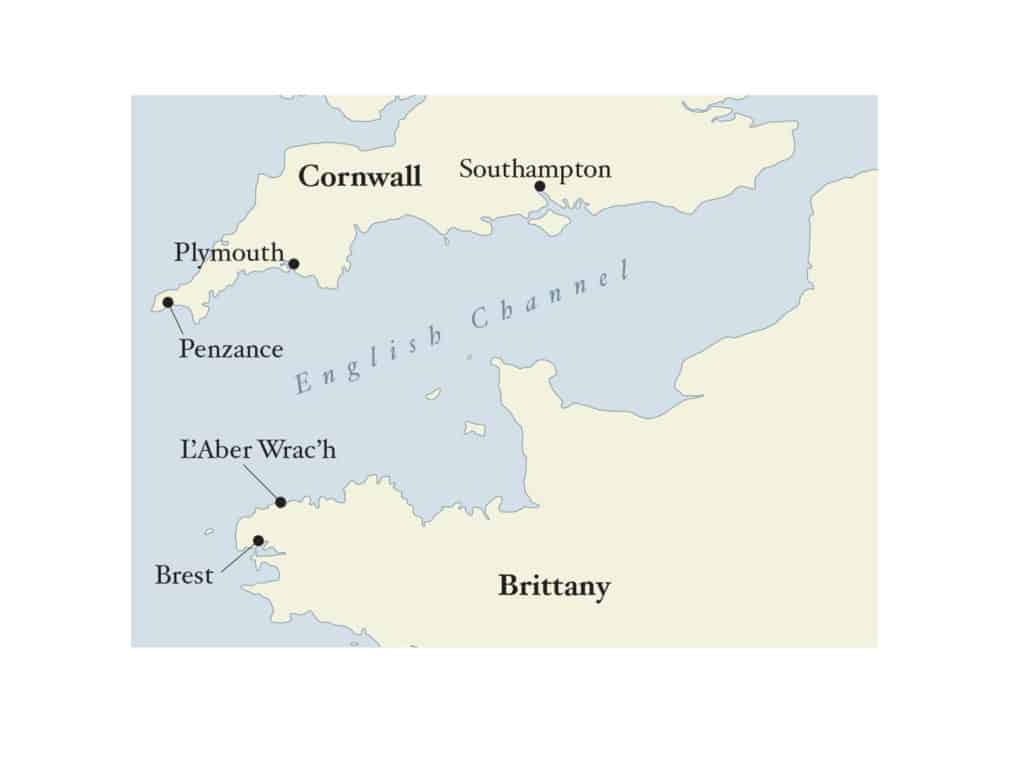
The Bretons make a smooth, dark ale, and we all sat outside Café L’Escale at small tables and chairs in the sunshine and enjoyed a pint. Then the captain and the mate began to drink in earnest. It was a good time for me to take a walk along the main street, Ar Palud.
Ar Palud (“the marsh”) is not very long, and eventually it turns inland and winds uphill. The harbor end of the street was dominated by a large sailing school that was filled with shouting kids in Optimist dinghies and Hobie Cats, on windsurfers and SUPs. They threaded their way through the marina into open water.
I found Le Café du Port, a market/cafe, and bought a couple of fresh baguettes for the galley and a pain au chocolat for myself. On the way back, I walked past Café L’escale, and found the captain, mate and second mate still quaffing their pints.
By dinnertime, the three of them were roaring drunk, and the captain was getting belligerent. George, a tall man in his 70s, couldn’t match the younger man’s capacity. He stood up, wobbled, and demanded oysters. He plunked back down onto his chair. Later, we had dinner at La Palue, a very good Italian restaurant along the waterfront, and spent a fitful night on board the boat.
After breakfast the next morning, the captain looked up from his charts and suggested moving the boat to L’Aber Benoit. This small community lies just around the peninsula from L’Aber Wrac’h, and is noted for oyster farming and seaweed harvesting.
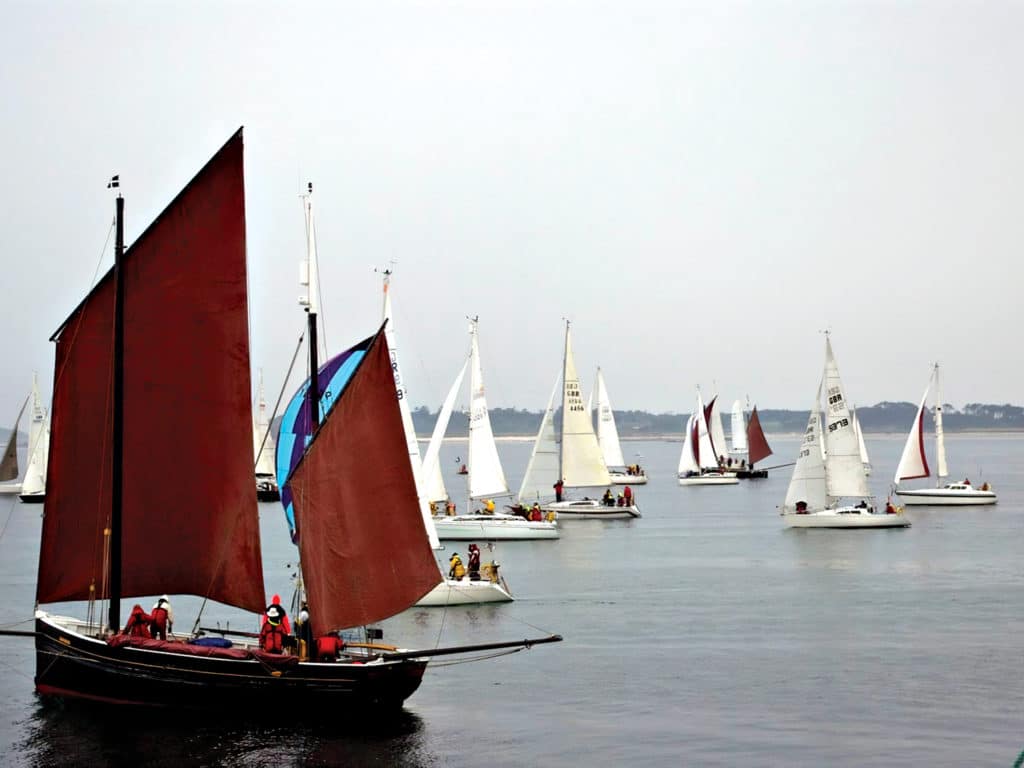
“We could anchor in there and save the dock fees,” Jack said with a nod.
Since the Happy Return crew splits all of the trip expenses, we agreed. We cast off our dock lines, and with chart in hand once more, the captain navigated past rocks and seaweed-harvesting boats as we entered the narrow estuary leading to L’Aber Benoit. There wasn’t room to anchor, but moorings were available near the working wharf. The harbormaster arrived and collected a mooring fee, which was about half the dockage at L’Aber Wrac’h. The captain paid for two nights. The inflatable dinghy was unrolled, pumped up and launched, then the crew went ashore to explore and resupply.
It turned into an afternoon’s walk across the peninsula, and we wound up back in L’Aber Wrac’h. Time for a refreshing pint. By dinnertime, Jack, George and the second mate were once more drunk as lords. The captain and the rest of the crew staggered back to La Palue for pizza and steaks. George was left behind demanding oysters again. I like oysters, so I agreed to dine with my watch mate at a fish restaurant.
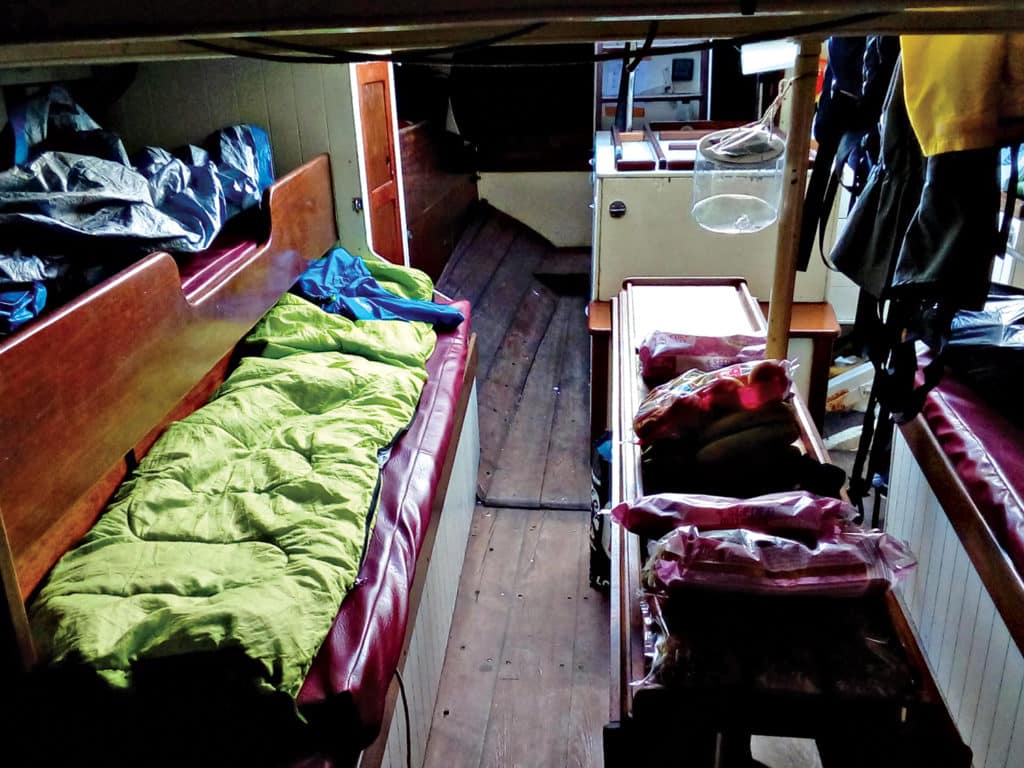
L’Ecallier des Abers is a small seafood restaurant right on Ar Palud, and is run by Monsieur and Madame Robin. We sat outside at a small table. Monsieur was in the kitchen, and Madame brought us a basket of crusty bread and two gleaming platters of raw oysters. The fresh oysters had that tangy brine and subtle sweetness of high-quality shellfish. George sobered up quickly as he ate and turned into an agreeable dinner companion. I ordered a small pitcher of white wine. The main courses arrived, a lovely grilled fish each, perfectly cooked, surrounded by vegetables and potatoes. The conversation was cordial, but soon it was time to get back to the boat. It was too far to walk after that big meal—perhaps the captain could chip in for a taxi.
George rang him up, and I could hear him shouting through the speaker.
“I can’t do anything with him,” George said, and handed me the phone.
“Jack,” I said, “how about a taxi back to the boat?”
“Bugger you lot,” he slurred. “If you want a taxi, you can take one your bloody selves!”
And he hung up.
Madame called us a taxi, and since it was the only taxi service in the town, the driver told us that he had just taken the captain and the rest of the crew back to “zee black bateau.” We waited on the dark shore for the second mate to retrieve us in the inflatable. I could still taste the brine of those oysters.
The trick to drying T-shirts without clothespins is to thread the clothesline through the arms. As I hung up a few shirts to dry in the morning sun, Jack pulled the inflatable alongside.
“Going to pick up those supplies we didn’t get yesterday,” he said. “Who wants to come along?” Silence. Then, the second mate volunteered.
Three of us stayed on the boat. Another went ashore for a walk. The other crew and I were glad to have some downtime, but once again, George was preoccupied with the weather. I had found a comfortable spot on deck when he interrupted my reading.
“There’s some weather coming through, but there’s a fair window for the next 24 hours,” he said. “We can miss the worst of it if we leave for Penzance today.”
Today? The crew and I looked at each other. What was the rush to get back to Penzance? This was our summer cruise, and 10 days had been scheduled. Then again, did we really want to spend another week with these guys?
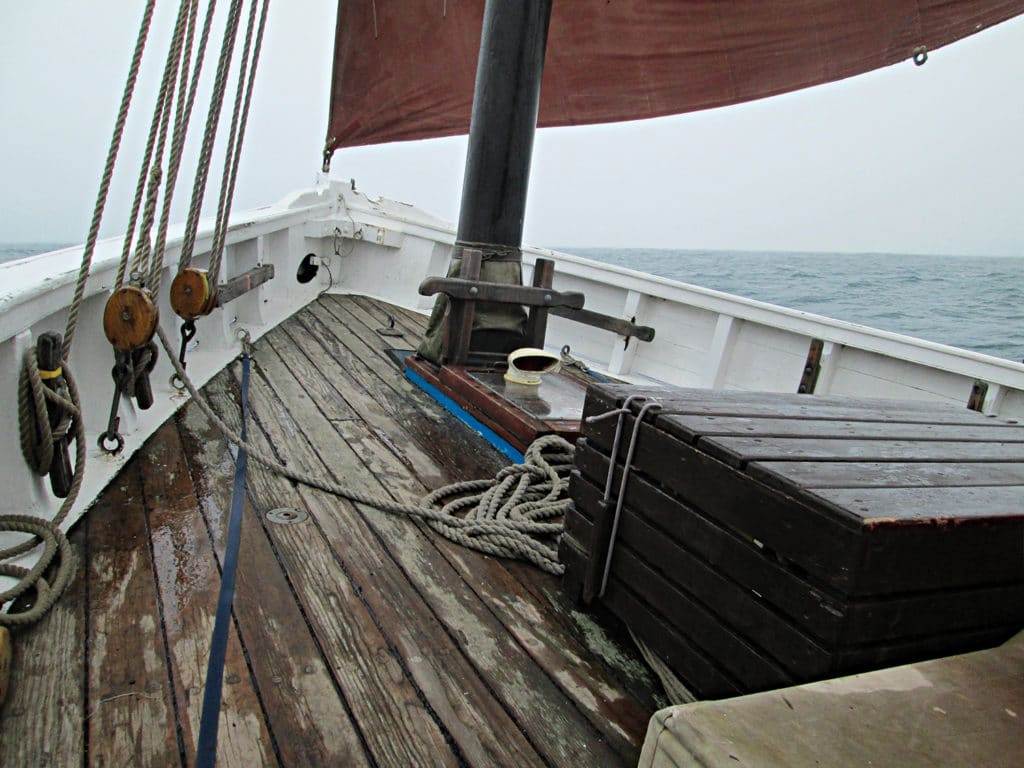
George was determined to have his way. He was now on the phone with the captain, cranking the wheels of urgency. The captain returned. We rolled up the inflatable, put on life jackets, and warmed up the engine. The mooring line was plopped overboard, and once more we threaded our way through the rocks.
My T-shirts hadn’t even completely dried. But the return trip was uneventful.
Once we’d arrived at Penzance, I quickly remembered the waterfront is full of hearty watermen, cunning rogues and small craft aplenty. I always miss it when it’s time to leave, but soon enough, small cars arrived, and as the crewmembers pushed their gear into various makes and models, goodbyes were said and hands were shaken. Jack and I found ourselves left on the quay looking down at the old lugger. The tide was dropping, and the boat settled itself in the mud.
“Let me buy you a cup of coffee,” he said at last. “Sure,” I replied. And off we went to Harbourside Cafe.
Now, the best thing about the Harbourside is that it’s convenient. They make a decent freshly ground coffee, and the two ladies that run the place are pleasant.
We walked in, Jack leading the way like he owned the place.
“What would you like, my darling?” asked one of the ladies.
“Coffee,” he said, and I said to make it two.
Jack was an affable talker who enjoyed a willing audience. He regaled me with stories of commercial fishing, his latest construction projects at home, and—head bent a little closer—the woes of married life. But not a word about the trip to Brittany.
Perhaps this guy is OK, I thought.
Our cups were empty when he saw his wife drive past us and turn onto the quay. He stood up abruptly, rattling the cups.
“Catch that, will you?” he asked, and he sprinted for the door.
I looked down at the table. The scoundrel had stuck me with the bill.
Maine-based writer David Bond currently teaches English to (oftentimes) unruly children in Frankfurt, Germany.When summer arrives, he gratefully sails out of Penzance, Cornwall. His new collection of Kennebunkport sailing stories, Adventures in the Charter Trade, is available on Amazon.
Know Thy Luggers
Traditional fishing luggers might have one or two masts, even topsails on each sail, but the fastest of the luggers were the three-masted “smuggling” luggers. These slippery boats often had three sails set on each of their masts. It has been recorded that in a whole-sail breeze (no reefs), the fastest of the three-masted smuggling luggers could make the 100-mile crossing from Cornwall to Brittany in eight hours. That’s an average speed of 12 knots, which is very impressive sailing by today’s standards, let alone 200 years ago.
But they’re a handful to sail. Everything about a dipping lug sail is heavy: the spars, the blocks, even the sailcloth. The sheer weight of the thing makes it a challenge to tack; jibing in heavy seas can be a dangerous proposition.
Since the luff of the sail is forward of the mast, the yard at the head of the sail must be lowered and shifted to the opposite side when tacking. First the halyard is eased, and the yard is lowered until its heel touches the deck. Now the yard is parallel with the mast. Then the yard is wrestled around aft of the mast and rehoisted on the opposite side for the new tack. Meanwhile, the “burton,” which is a combination shroud/backstay, is released and hauled to the opposite side of the boat and reset. Finally, the sail can be manhandled around the mast for the new tack, hoisted, cleated and sheeted in.
Until the next tack. Then it all begins all over again.

